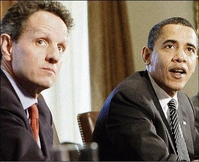COMMENTARY - Will Obama-Geithner plan save capitalism or hasten demise?
Published: Friday | March 27, 2009

United States Treasury Secretary Timothy Geithner (left) and President Barack Obama in the Cabinet Room of the White House in Washington on Monday, March 23. - AP
Karl Marx was convinced of capitalism's demise once it exhausted its internal possibilities for generating wealth through processes of technological and societal change - spearheaded by the capitalists.
So it seems the possibilities have not yet been exhausted.
Josef Schumpeter gave us the notion of 'creative destruction' as the indispensable engine of capitalism, but he was pessimistic. In the 1940s, when asked about the future of capitalism, he said it could not survive.
And in the recent Wall Street meltdown, some see the beginning of the end: the fall of capitalism as we know it, the end of the American empire. But the Chinese feel capitalism has at least another 300 years to go.
Models abandoned
Who knows? Soviet command and collectivisation - not having unleashed boundless creative and productive forces - were finally abandoned.
Consequently, at least in part, the Cold War thawed. The Mahalanobis planning models and implementation used by India were abandoned for free enterprise under Manmohan Singh first as finance minister then as prime minister.
Mao's China is now unrecognisable. Seems the human drive described as greed is the single most precipitate driver of wealth creation as yet discovered.
Paradoxically, the drive seems periodically to create conditions for at least momentary collapse.
Globalisation
Modern, 21st century capitalism has created the World Trade Organization, globalisation, freedom of capital movement and trade, and, of course, financially engineered derivatives - all pillars of the international capitalist system.
Yet, in their seamless operation, they present the potential for huge problems once something like the Wall Street meltdown happens.
Because everything is so interconnected, falling demand and cancelled orders in California led to factory closures in China in a matter of days and not months as it would have a mere 20 years ago.
So, rescue of the United States financial system is a must for worldwide economic prosperity.
President Barack Obama and his Treasury Secretary Timothy Geithner have finally emerged with their proposed solution.
It has been met with enthusiasm on Wall Street for the simple reason that insolvent banks are now meant to have their worthless debt bought up by government and private venture capital with taxpayer backing for 85 per cent of the final exposure, whatever that is.
Lack of equity

Wilberne Persaud, Financial Gleaner Columnist
Critics of the plan fault it for basically two things.
First is its lack of equity in that upside benefits accrue to private investors while downside risk is solely that of the taxpayer.
The second concern is that the uptake of these so called 'toxic' assets will be too slow and, in any case, where's demand for loans to come from with monthly job loss at 600,000?
If workers underwater in home mortgages cannot go out and buy cars and flat screen TVs, then to whom will the banks lend anyway?
Value of US dollar
Seems to me both these criticisms have merit. But the critics don't seem to understand that Obama and Geithner have to operate in a real world political and ideological environment.
Much as I fear for the plan's success and really abhor its lack of equity, it seems as if it is the most we can expect from present day America - an America whose captains of industry themselves won't appreciate the long-term negative impact of their robust ideological position.
One final note on China's fears concerning the value of the US dollar in the medium term: US and OECD policy makers in general, need to consider this in their preparations for the G-20 meeting next month. This problem is not amenable purely to a nation by nation solution.
Where does Jamaica and CARICOM stand in all this?
We must be vigilant, keeping abreast of all developments affecting our trade and financial sector activities. Free trade has never really existed in the world.
Countries claim and push it when it suits their interest. Subsidies of all sorts abound in the OECD even as they insist on market solutions to agriculture and farmers' concerns.
Attempting the impossible
So Jamaica must comply because of its need for assistance, cannot balance its books and cannot mount a convincing enough stand in negotiation to allow both subsidy and aid.
A good start would be to eliminate waste, avoid the excessive 'rent' associated with corruption and reduce tax evasion.
These are all difficult to do. Yet these times call for attempting the hitherto impossible.
wilbe65@yahoo.com
















